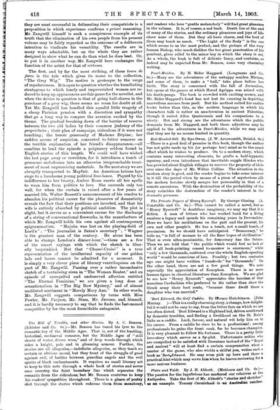The Private Papers of Henry Ryecroft. By George Gissing. (A.
Constable and Co. 68.)—This cannot be called a novel, but as "Henry Ryecroft" is doubtless imaginary, we may say that it is fiction. A man of letters who has worked hard for a living receives a legacy and spends his remaining years in Devonshire. Here we have his meditations on the past and the present, his own and other people's. He has a touch, not a small touch, of pessimism. So we should have anticipated. "Democracy," he tells us, "is full of menace to all the finer hopes of civilisation." That is even ultra-pessimistic, for democracy has the future. Then we are told that "the public which would feel no lack at all if all book-printing ceased to-morrow is enormous," while "only a few thousands, scattered over the whole English-speaking world" would be conscious of loss. Possibly ; but two centuries ago one might have written " hundreds " for "thousands." On
the other hand, there are not a few good things. We note especially the appreciation of Xenophon. There is no more
human figure in classical literature than Xenophon. We are glad to see how "Henry Ryecroft" appreciates the heroism of that nameless Carduchian who preferred to die rather than show the Greek army their best route, "because there dwelt there a daughter who was married."










































 Previous page
Previous page